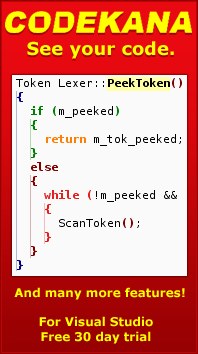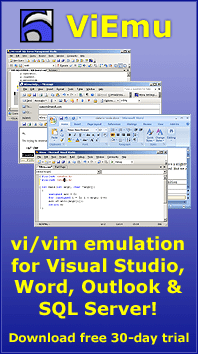Programming productivity
I always have an eye on my own productivity. Don’t misunderstand me, I’m no productivity freak. I don’t buy in all the “Get things Done” or Steve Pavlina’s productivity obsession based on pushing yourself. Years ago, I would feel guilty of having spent too much time watching TV, reading or generally procrastinating . I spent way too many years in the vicious cycle of not getting things done, not forgiving myself, feeling guilty about it, and falling in the same hole again and again.
(BTW, do read the link above if you haven’t yet, it’s one of the funniest things I’ve ever read.)
Later, I’ve learned that, when you don’t do something, there is always a reason. And your best possible effort is to discover it – not to put pressure on yourself to crush the reason. That’s just doing stuff over and above your own instinct, a nasty thing to do.
The most common reasons I’ve found are: (1) I didn’t really want to do it, or (2) I was afraid of something.
When you discover that you really don’t want to do something you’re trying to push yourself into doing, the best thing you can do is to take the steps to actually not to do it. If there are other people involved, you probably have to tell them you are not going to do it. If the task was the center of your life, you probably have to actually discover what you actually want to do with your life (a tough task). Sometimes the implications are so overwhelming that your best choice is to simply do the thing, because of other reasons. But then, you know why you are doing the stuff, and you won’t be punishing yourself for not actually doing with pleasure what you really don’t want to do.
The other very common reason is that some fear is pushing you back and making the unconscious decision that it’s better not to tackle whatever it is, lest whatever the fearful thing may happen. Sometimes it is fear of failing, and discovery of failure would be much worse than just having the task lying around. Sometimes it is fear of others seeing you fail. Anything.
I am digressing, I wanted to focus on the feelings that come with programming.
The deal is that, even when you are actually pursuing a goal you really want to pursue, there may be a myriad of little tasks in the way that are not satisfying by themselves, but you still want to do them for the goal you will be getting towards. In programming, I often find out that a lot of the things I have to do are not really a pleasure, it’s the final goal that matters to me. I’m the kind of impatient guy, and I think much faster than I code (who doesn’t?), so I have a lot of conflicting feelings when programming.
Knowing that I have to deal with the Windows API is the typical part that I really hate, so tasks that involve that tend to get done later than others. But not only those, mostly every programming task creates some feeling of discomfort. I actually have to drag myself to actual coding, which is much less fun than thinking up the design of things. I think programming tools will evolve in the sense in which programmers will have more of the fun part and less of the nitty-gritty-nasty-details part (think, assembler programming was much worse than C/C++ programming and most programmers can actually get a lot more work done, just by not having to worry about in which registers do things get put).
I can attest that I do this dragging quite successfully, as I’m averaging at about 300 lines of code per day for the past few months, which is quite a lot. And the code is of quite high quality, not that I’m writing a mess – I can produce that much because I am quite eager to have all the core of the editor working in order to start with the innovative stuff. But even then, I find I have to push myself into doing things every day. Reading JoS forums is too often a much more interesting temptation.
Anyway, I tried an experiment yesterday and it has worked nicely. There were three tasks that I had to accomplish in order to get to the next step. Vi/Vim emulation is working so that it’s mostly complete for my everyday usage (complete vi emulation is really a large lot and I don’t need every single little command), and after I get to my desired level of emulation completeness I’ll be moving to other areas of NGEDIT development. The three tasks were actually:
- Smart input buffer: in vi, you enter a special “input” mode whenever you are going to add new text. The ‘.’ command later on lets you repeat whatever you input (inserted characters, replaced characters, erased characters, etc). I use that continuously.
- Named clipboards (“registers” in vi slang). You use them in vi much more often than in regular editors, as they are very
straightforward to use and for some other reasons. This feature is not only useful for the vi interface, but for normal editor interface as well. More importantly, the clipboard in the editor has been “internal” until now, with no interaction with the windows clipboard, and this task involved starting to deal with the Win32 API. - Selection types: just the regular character/line/column types of selections for copy/pasting. Character selections are implemented a long time ago, but I really need the other types for everyday usage.
I was looking at this as a somewhat steep hill to climb, with three separate “pushing myself’s”, one for each task.
Instead, I tried an alternative: I would start the three tasks at once, cutting through the need of three separate starts. I would get to the VimEmu.ngs script, implement the script side of the three of them, and then go through the other areas of the application source and get the three of done in each part. This would mean that the application wouldn’t compile for some time, but I know that compiling and testing a minor thing is often an escape from actually confronting the programming task at hand.
How did it go? I think it’s gone quite well. The features are not finished yet, but the smart input buffer was completely implemented yesterday (if not working perfectly). The named registers (clipboards) are mostly working and code to write to / read from the windows clipboard is there (even if not all cases of text encoding conversions are working). And the selection types are lacking the core low-level implementation (actually displaying the different selections and actually reading/writing the right text when copy/pasting), but all the framework including communication with NGS is there.
I’m hoping I can get a decent chunk of that finished today. And I think I gained some time, and avoided some dismay, by “parallelizing” the starting-up conflict of the three.
PS: Does anyone know why on earth non-platform-native text on the Windows clipboard is not characterized by the codepage but by the locale? It seems that if I have text in the codepage used in Russia, I can’t paste it into the windows clipboard, unless I look up what their currency or date format is. And no, I don’t yet know how to get from the codepage to the specific locale – I’m using Unicode for copy/pasting in those cases.



January 28th, 2009 at 9:39 pm
Thanks for your musings. There is truth in what you say, but there can be another side to. I’m an amateur who used to program for fun when I was single and will still simplify tasks at work with the occasional programming project. My procrastination has taken on an added dimension: I have to spend so much time taking care of my wife and kid that if I do have an odd moment to myself, I know I can’t write a productive line of code before somebody is hollering for help. Control of the clock is like that of a superbowl winning team.
I have a project that I think would be helpful that I have tried to do for years and have made progess on at times. I had gotten to just short of putting in the neat parts, well closer to that anyway than I had been. If I have extra time, I’ll play a game of speed chess on the net–you can always hit the resign button. It has been such a long time that I have had a decent chunk of time to put into programming that I pretty much want it at least as much as sex.
My wife has neurological problems giving a lot of pain. My son is autistic in a high functioning way. Both take a lot of time and care. I’m kind of ashamed of having my own agenda, but have a problem just denying a side of myself as my skills, such as they may have been, atrophy.
January 29th, 2009 at 1:06 pm
Zoltan, thanks for your comment. This was an old blog post, but I’m still dabbling with my issues with productivity. You can check some of the more recent thoughts here: http://blog.ngedit.com/2009/01/28/laser-like-focus/ (although, after posting, I thought this might have needed to be a bit more tongue-in-cheek).
If you have very, very little time, I’d suggest you simplify your goals and expectations to very distilled things. I’d suggest you use Python or a similarly high-level language, so that you don’t have to waste a moment in stupid stuff (like Java, C++, etc… force you to).
If you’re into visual / graphical things, I think you should also consider the Processing language, or even ActionScript (Flash). I saw this yesterday:
http://www.25lines.com/?page_id=186
That’s what some people can do with 25 lines of code! The language you are using makes a great difference – it’s impossible to do one tenth of that with 1000 lines of Java or C/C++.
You shouldn’t be ashamed of needing a bit of time to satiate your intellectual needs, the same way you shouldn’t be ashamed of needing to eat, sleep or go to the bathroom. If you don’t pay a bit of attention to your needs, you won’t be the happy person who others need for help.
My respect and my best wishes, good luck with your wife and your son.